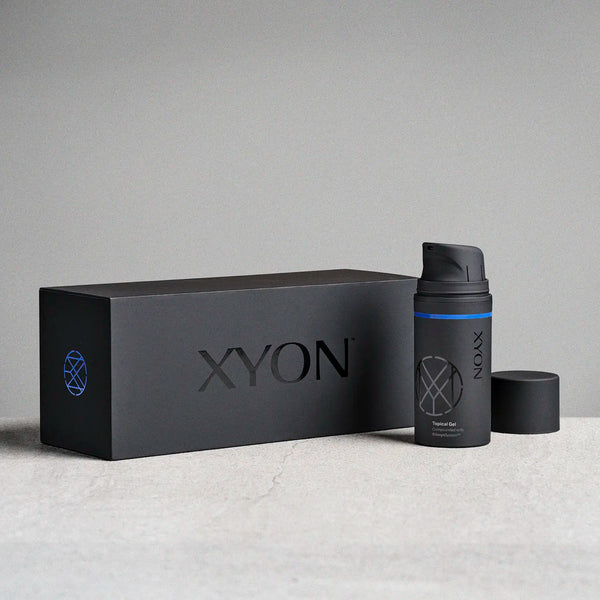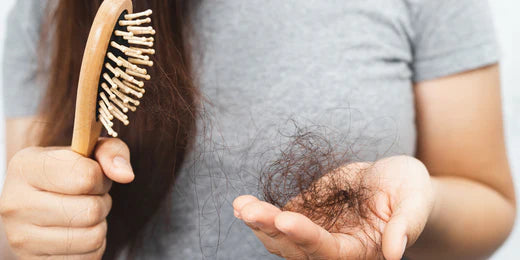When googling which medications cause hair loss, you’re likely to come across countless different types that have been linked to hair loss or thinning. Everyone can react differently to medications and this can unfortunately mean that some people experience rare side effects, including hair loss. In this article we’re going to focus on four types of common medications that have been associated with hair loss and look at the possible mechanisms behind these links. Here are the medications we’ll be covering in this article:
- Blood pressure medications
- Acne medication
- NSAIDs, such as ibuprofen
- Birth control
Remember, this isn’t an exhaustive list and there are other drugs that can trigger hair loss in certain individuals. If you’re taking a medication that you don’t see mentioned here and think you might be experiencing thinning, we recommend consulting with a doctor or other healthcare professional for guidance.


Start your journey to stopping your hair loss
In just a few months, see real results with a clinically proven treatment for hair loss.
Can birth control cause hair loss?
Birth control is a broad term used to describe a range of different medications and methods for preventing pregnancy. Here are some types of birth control you might’ve come across:
- The contraceptive pill
- Intrauterine device (IUD) - also known as the coil
- Contraceptive implant
- Injections
- Barrier methods (including condoms and diaphragms)
- Natural cycle tracking
Whilst hair loss caused by birth control is rare, contraceptive methods containing hormones are the most likely to affect the hair growth cycle. Let’s take a look at the most common type of hormonal birth control, the oral contraceptive pill (OCP).
The pill typically comes in two varieties: one containing estrogen and progestin, known as the combination pill and the other being a progestin-only pill, commonly called the mini-pill.
When you add exogenous hormones into the body, the levels of other hormones in the body are disrupted and for some, this response is enough to trigger something called telogen effluvium. Telogen effluvium is a type of temporary hair loss that causes diffuse hair shedding across the scalp. It’s typically associated with an initial ‘stressor’ that can be pinpointed as the trigger. In the case of birth control, the disruption to hormones would be the ‘stressor’.
On a healthy scalp, around 90% of hair follicles will be in the active growth phase (anagen phase) at any given time. However, a trigger like a change in hormones can cause the hair follicles to enter the telogen phase prematurely and stay there for too long and this results in excessive hair shedding.
Other types of contraception involving hormones, such as the Mirena coil and injectable birth controls may also carry the risk of inducing telogen effluvium.
Because the triggering factor is the disruption to hormones, stopping or changing your contraceptive pill may worsen hair shedding, as this will further alter hormone balances in your body. Whilst it can feel frustrating, it’s important to give your body the chance to adjust to the new medication and allow your hair to regain a healthy growth pattern.
Does accutane cause hair loss?
Accutane is one brand name for isotretinoin, which is a popular medication used to treat acne. A proposed mechanism of action of this medication for acne is the reduction of sebaceous glands and sebum production on the skin (Pile & Sadiq, 2023). Although it can be effective at clearing stubborn acne, there have been some reports of hair thinning and hair loss associated with taking isotretinoin.
According to various studies, the percentage of patients experiencing hair thinning or hair loss while taking isotretinoin ranges from 0.28% to 12% and these cases are attributed to telogen effluvium (Tran et al, 2022).
Unlike birth control where telogen effluvium is caused by hormonal changes due to taking medication, the trigger from isotretinoin appears to be more directly down to the drug itself. It’s difficult to pinpoint what exactly it does to the body to trigger telogen effluvium and additional research would be beneficial to better understand this topic.
There’s some research to suggest that higher doses of isotretinoin are more likely to influence the hair growth cycle (Isamolgu & Altinyazar, 2018) and so, lowering your dose may be an option. But it’s important to note that you should never alter your medication without consulting your doctor first.
Does ibuprofen cause hair loss?
Ibuprofen belongs to a group of medications known as non-steroid anti-inflammatory drugs (NSAIDs) and these are typically used to as painkillers, to help reduce fevers, as well as treating conditions like arthritis. Whilst very rare, there have been some cases of hair loss associated with NSAIDs. Like most drug-induced hair loss, this is likely attributed to telogen effluvium. In this instance, it seems to be the introduction of the active ingredient into the body that triggers the onset of telogen effluvium, thus it seems to be a direct cause of the drug.
Blood pressure medication and hair loss
Many types of blood pressure medications (antihypertensives) have been linked to hair loss, including the commonly prescribed beta-blockers (such as metoprolol and bisoprolol) and ACE inhibitors (such as ramipril and captopril). Most blood pressure medications work by widening blood vessels to increase blood flow. In many instances, this is beneficial for hair growth as it can improve the supply of oxygen and vital nutrients to the hair follicles. However, it’s possible that in rare cases, the blood flow to the scalp could be compromised which could impact the hair growth cycle and cause hair shedding. There’s limited research investigating this link, but in a case study of a man experiencing hair loss induced by lisinopril (an ACE inhibitor, switching to a medication with a different mechanism of action resolved the hair loss (Kataria et al, 2017).
What can I do about medication induced telogen effluvium?
It’s important to remember that everybody may react differently to medications and hair loss tends to be a rare side effect. But if you do experience drug-induced hair loss, it’s most likely temporary. Telogen effluvium doesn’t cause damage to the hair follicles themselves, meaning that the hair can (and should with time) grow back. Typically, telogen effluvium will begin 8-12 weeks after a triggering event and it tends to resolve within 3-6 months of initial shedding. However, some people suffer from chronic telogen effluvium, which is considered shedding that lasts beyond 6 months.
Beyond waiting for hair shedding to stop on its own or altering your medications (depending on the drug), there may be additional steps you take to maintain healthy hair. For a non-medicated approach, you could consider choosing haircare products designed to optimize hair growth and support the follicles. An example would be XYON’s Revitalize Hair-Boosting Serum, which has been formulated to maximize hair growth with the help of growth factors that positively influence the hair growth cycle.
Takeaway
Ultimately, every medication comes with the risk of side effects and unfortunately this can sometimes include hair loss. Whilst we’ve only touched on a few different medications, there are likely others that have been associated with hair loss and we recommend speaking to your doctor at the first signs of shedding. Speaking to a specialist will ensure that there are no other underlying factors at play and allow you to establish a plan of action to tackle hair loss.
References
Islamoglu, Z.G.K., Altinyazar, H.C. (2018). Effects of isotretinoin on the hair cycle. Journal of Cosmetic Dermatology, 18(2), 647-651. https://doi.org/10.1111/jocd.12800
Kataria, V., Wang, H., Wald, J.W., Phan, Y.L. (2017). Lisinopril-induced alopecia: A case report. Journal of Pharmacy practice, 30(5). 562-566. https://doi.org/10.1177/0897190016652554
Pile, H.D., Sadiq, N.M. (2023). Isotretinoin. In: StatPearls, Treasure Island (FL). https://www.ncbi.nlm.nih.gov/books/NBK525949/
Tran, P.T., Evron, E., Goh, C. (2022). Characteristics of patients with hair loss after isotretinoin treatment: A retrospective review study. International Journal of Trichology, 14(4), 125-127. https://doi.org/10.4103%2Fijt.ijt_80_20




